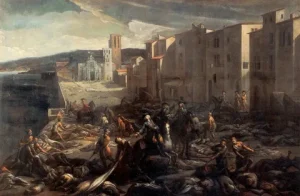History is more than a record of events; it is the foundation of a society’s identity. It connects generations, teaching lessons from the past to shape the future. Yet, what happens when history is erased? Can a society indeed survive without its past? Michael A. Nawrocki’s novel, The Treasure Chest, explores this worrying possibility through a dystopian vision of The Great Cleansing. In this period, America erases its historical records, culture, and even personal memories to build a supposedly perfect “Good Society.” What is a world where individuals are stripped of their connections to the past, existing in a present where everything has been wiped away before the last five years?
At the novel’s heart is Thomas 6771, a man like all others in this new America whose name has been replaced by a number assigned according to his profession. He has no recollection of family, childhood, or personal experiences beyond what the government has allowed. This is not accidental. The Good Society’s leaders believe history is the source of all division, inequality, and unrest. By eliminating books, music, religion, and even competitive sports, they claim to have created a world where everyone is equal, free from past biases or conflicts. However, as the novel clarifies, the reality of this manufactured utopia begins to crack, revealing a world devoid of meaning, depth, and true personal identity.
Erasing history to create a more unified society is not entirely fictional. Throughout history, various regimes and governments have sought to control the past to shape the future. Book burnings, censorship, and rewriting of historical narratives have been tools of oppressive rulers seeking to manipulate collective memory. In today’s world, similar debates rage on. Statues are torn down, school curriculums are rewritten, and historical figures are reevaluated through modern perspectives. Some argue that this is necessary for progress, while others fear that erasing the past risks repeating its mistakes. His novel forces readers to confront this tension, raising the question: can a society truly move forward if it refuses to acknowledge where it came from?
In the book, the government’s attempt to erase history extends beyond just books and monuments; it invades the very minds of its citizens. Advanced medical treatments systematically remove memories, ensuring that people do not recall their previous lives. The Good Society is designed to function without nostalgia, pain, or historical context. This chilling concept echoes real scientific advancements in memory alteration. While still in its infancy, research into memory modification is progressing, raising ethical concerns about the potential for abuse. If a society could selectively erase trauma, would it also erase the lessons that come with it? If people forget past mistakes, are they doomed to repeat them?
His journey takes him beyond the limits of this controlled existence, where he begins to reveal fragments of the forgotten world. He stumbles upon remnants of history, a book, a song, an old photograph, and each sparks something deep within him. Though his memories have been erased, his sense of curiosity and wonder remain. His gradual rediscovery highlights an essential truth: identity is not just about what we remember but about what we feel. Even in a world where history has been systematically removed, there is an undeniable pull toward the past and a need to understand where one comes from.
One of the most striking elements of the novel is how history refuses to stay buried. Even with all the government’s efforts, traces of the past still surface, proving that history is not just a collection of facts stored in books. It is a living, breathing force. This idea aligns with the real-world phenomenon of cultural memory, where certain traditions, symbols, and narratives persist despite attempts to erase them. Even in the most oppressive regimes, stories of the past survive through whispered conversations, hidden artifacts, and the collective spirit of those who refuse to forget.
The book’s erasure of history serves as an advisory tale. The Good Society’s leaders believe they are creating a perfect world, but they have stripped people of their purpose and sense of self. Without history, there is no foundation for values, no shared experiences to bind people together, and no wisdom to guide future generations. The book suggests that a society without history is like someone with amnesia: disoriented, vulnerable, and easily controlled.
As the story progresses, it becomes clear that the cost of forgetting is far greater than the cost of remembering. By the end of his journey, the readers will learn that progress is not about erasing the past but learning from it. The story serves as a potent reminder that history, no matter how painful or complicated, is essential to what makes us human. Only by confronting and understanding the past can societies build a meaningful and authentic future.



